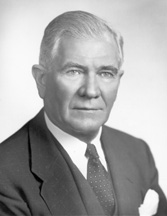- Absalom Willis Robertson
Infobox Senator
name=Absalom Willis Robertson
nationality=American

jr/sr=Senator
state=Virginia
party=Democratic
term_start = 1946
term_end = 1966
alongside=
preceded=Thomas G. Burch
succeeded=William B. Spong, Jr.
date of birth=birth date|1887|05|27
place of birth=Martinsburg, West Virginia
dead=dead
date of death=death date and age|1971|11|2|1887|05|27
place of death=
spouse=
religion=EpiscopalianAbsalom Willis Robertson (
27 May 1887 –1 November 1971 ) was an Americanlawyer and Democratic Partypolitician fromLexington, Virginia . Also known as A. Willis Robertson, he representedVirginia in both the U.S. House and theUnited States Senate .Robertson was born in
Martinsburg, West Virginia , to Franklin Pierce Robertson and Josephine Ragland Willis. [ [http://www.wargs.com/other/robertson.html Ancestry of Pat Robertson ] ] He graduated from theUniversity of Richmond in 1907. Robertson was elected to the Virginia State Senate as a Democrat in 1915 and he served from 1916 to 1922. Robertson served in theUnited States Army duringWorld War I . Robertson served as Commonwealth Attorney forRockbridge County, Virginia from 1922 to 1928.Robertson was elected to the House of Representatives in 1932, and was reelected six times. In 1946, he won a special election for the right to complete the final two years of Senator
Carter Glass ' term and took office on the day after the election. He won the seat in his own right in 1948, and was reelected two more times without serious opposition.Robertson was a typical Byrd Democrat, and was very conservative on social issues. He was chairman of the
U.S. Senate Committee on Banking, Housing, and Urban Affairs from 1959 until 1966. In 1956, Robertson was one of the 19 senators who signedThe Southern Manifesto , condemning the U.S. Supreme Court decision inBrown vs. Board of Education and the resulting public desegregation.When President
Lyndon Johnson sent his wife, Lady Bird, on a train trip through the South to encourage support for the Civil Rights andVoting Rights Act s, Robertson was one of four Southern Senators who refused to meet with her on the whistle stop trip. In retaliation, President Johnson personally recruited State SenatorWilliam B. Spong, Jr. , a considerably more liberal Democrat, to run against him in the 1966 Democratic primary. By this time, even some Byrd Democrats were moving away from obstinate resistance to integration as espoused by Robertson and the Organization's patriarch,Harry F. Byrd, Sr. Spong defeated Robertson in the primary in one of the biggest upsets in Virginia political history--an event that is considered the beginning of the end of the Byrd Organization's long dominance of Virginia state politics.Willis' best known son is
televangelist Pat Robertson .tatements on Civil Rights
March 10, 1956, "Christian Science Monitor"
Asked to comment “on his region’s state of mind and any specific American attitudes he feels are necessary to avoid violence and bring healing in a deteriorating situation following the Supreme Court school desegregation order," Robertson stated:
“Virginia recognizes the correctness of the 1850 decision of the Massachusetts Supreme Court and in the 155 subsequent decisions of State and Federal courts holding that the equal rights provision of a constitution could be properly satisfied by public schools for the white and colored races which are separate but equal.
During the last 10 years notable progress has been made in the Southern States is meeting that equality requirement. But that progress will be nullified by a program of rapid, enforced desegregation. In fact, public education for both races in some Southern States would be destroyed.
The worst feature of the current desegregation effort, however, is the resulting bitterness and racial animosities in areas where harmony heretofore prevailed. Southerners believe that the cherished constitutional right of every citizen to select his personal associates is being violated.”
Monday, July 9, 1956," Congressional Record"
“I ask unanimous consent to have printed in the Congressional Record the weekly newsletter of my distinguished successor in the Seventh Congressional District of Virginia, Representative Burr P Harrison, in which he discussed the so-called civil rights bill now under consideration by the House. Representative Harrison’s analysis is lucid and accurate, and I fully endorse the position he has taken in opposition to it."
Harrison’s Report stated:
“Evan a casual reading of this bill, sponsored by the President, reveals it as one of the most drastic measures ever to receive consideration by the Congress.
It would set up a Federal Commission with a staff of snoopers who could roam the length and breadth of the United States, armed with subpoenas, looking for civil-rights incidents. One of the objectives of this Commission would be to advance the idea of complete racial integration in private business.”
Footnotes
External links
* [http://bioguide.congress.gov/scripts/biodisplay.pl?index=R000317 biographic sketch at U.S. Congress website]
Wikimedia Foundation. 2010.
